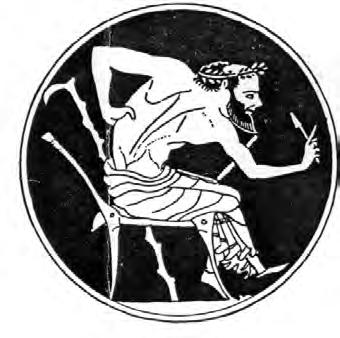
3 minute read
Robert J. Vrtis
from Agora Fall 2022
Director's Notes for Macbeth
by ROBERT J. VRTIS, Associate Professor of Theatre
Editor’s note: This director’s note is from the program for Macbeth, performed by Luther College students in November at Jewel Theatre in the Center for the Arts. In rereading Robert’s note, I was taken again by how the production engaged us in thinking about Shakespeare’s tragedy in a striking new way for today’s world.
Ifirst wanted to tell this story in a dark wood huddled around a campfire. Actors would speak the play in the hushed tones of a ghost story. I thought Shakespeare’s cursed play should feel like it is weaving through the shadows and bristling the hairs on the back of your neck, ready to leap out with a bloody dagger in the middle of a prolonged dramatic pause. Macbeth is supposed to be scary. Just the name spoken aloud makes actors jump. The play is said to be cursed. Maybe you already know this. Some believe Shakespeare delved too deeply into real witchcraft and included genuine spells, evoking the ire of dark forces. Maybe a handful of real witches took their revenge on the play with a curse. The play has been said to be riddled with mischance and even mysterious deaths ever since. But, when I actually planned to direct this play, I thought much more about the Witches’ Well. It’s a small monument across the open space in front of Edinburgh Castle; we occasionally visit the site on study abroad trips. It’s a quiet reminder of the thousands who were executed on charges of witchcraft – mostly women who were burned or hanged right in that open space – between the 16th and 18th centuries. King James VI, who this play was meant to thrill, was particularly keen to order witch-hunts. This is what terrifies me about Macbeth: violent men seizing what they want, murdering any real or imagined threat to their power, and exercising that power on any whim. It’s that that violence is sudden, implacable, and often entirely
unpredictable. It can’t be reasoned with because it operates absent of reason. And that violence is usually inflicted on people who just want to live their lives in peace. People who may not know why the soldiers are here, but can’t make them leave. And that violence sparks more violence. On and on. I adapted the Macbeth you’re about to see feeling that it should be horrifying, but that the horror is not supernatural. It’s very human. I wanted the violence to feel close, immediate, possible… Because that’s why Macbeth is scary. The witches don’t compel Macbeth to murder, they see something murderous and hungry for power in him already. The illusory dagger Macbeth sees before murdering Duncan merely sends him in the direction he was already going. This is perhaps the least optimistic production I’ve staged in some time, but I’d say that that is because the hope isn’t on stage and Lindsey Fry ('22) as Lady MacBeth and Josie Ramler ('22) as MacBeth so much harder to see. The hope is in the audience, who sit across the campfire from Macbeth, who can see that darkness spurring on the cycle of violence, and who can reject it.
IMAGE BY NICK GRESETH '23/LUTHER PHOTO BUREAU
Find the current issue and back issues of Agora online

You can read the current issue of Agora online, and you can also find and search all back issues by going to our webpage: www. luther.edu/paideia/agora.
Changing your address? Want to stop receiving Agora?
If you do, please email or write us. Contact Agora at agora@luther.edu or write Agora, Main 215, Luther College, 700 College Dr., Decorah, IA 52101.
The image at left illustrated early issues of Agora. The journal was established by the Paideia Program, and paideia translates as education. The image shows a teacher with his tablet on his lap and stylus in his hand.

